Abstract
1. We investigated the role of thromboxane A2 in the airway hyperresponsiveness that follows the inhalation of ozone in dogs by examining the responses to an inhaled thromboxane analogue (U46619). 2. Measurements of pulmonary resistance were made in anaesthetized dogs; the concentration of inhaled agonist causing an increase of 5 cmH2O l-1 s was calculated (provocative concentration). The effect of inhaled U46619 was studied on in vivo canine airway resistance, on airway responsiveness and on airways made hyperresponsive following the inhalation of ozone. 3. Inhaled thromboxane is a potent constrictor of the canine airway. The mean provocative concentration was 2.13 x 10(-4) M, compared to acetylcholine which was 3.23 x 10(-2) M. 4. Inhaled thromboxane did not result in the development of airway hyperresponsiveness to acetylcholine. Following U46619 inhalation the mean provocative concentration to acetylcholine was 3.92 x 10(-2) M. 5. Canine airway was not hyperresponsive to inhaled thromboxane following the inhalation of ozone. This was not due to an inhibition of acetylcholinesterase as the dogs were hyperresponsive to carbachol (a muscarinic agonist not degraded by endplate cholinesterase). 6. These experiments do not support a role for thromboxane in the development of airway hyperresponsiveness following the inhalation of ozone in dogs.
Full text
PDF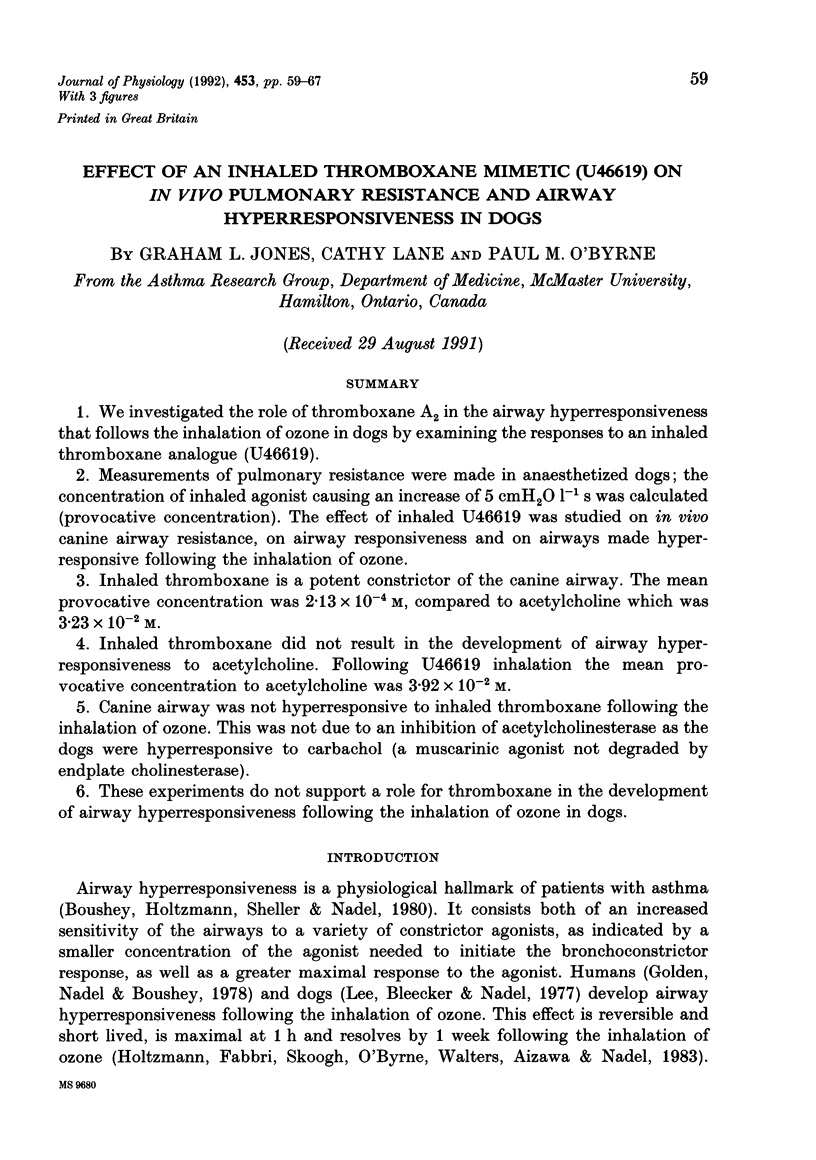
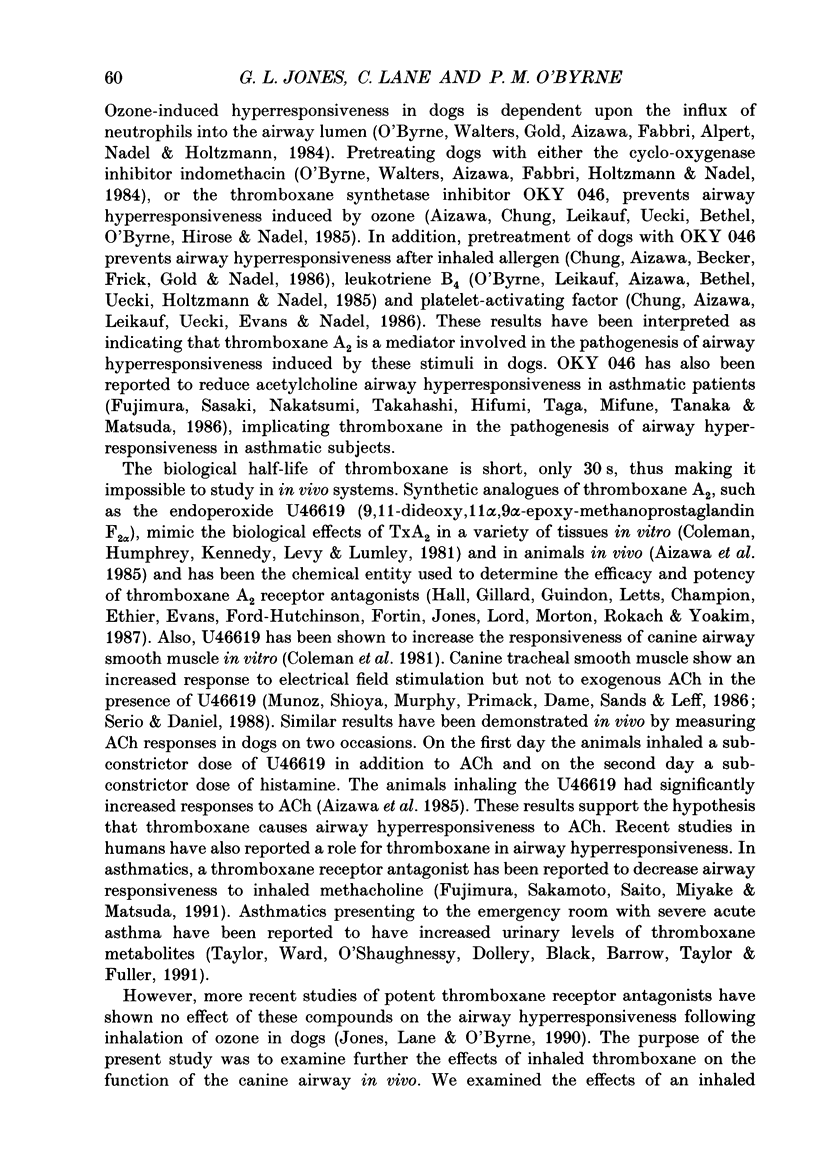
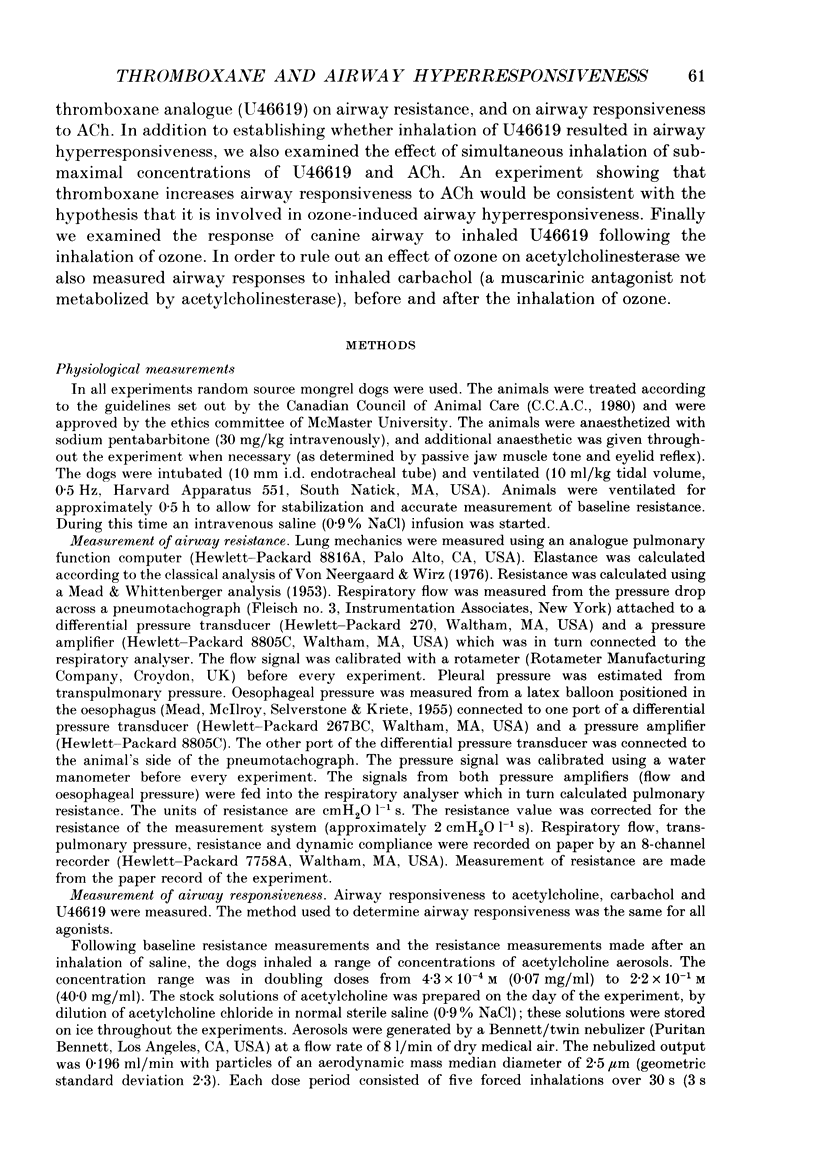
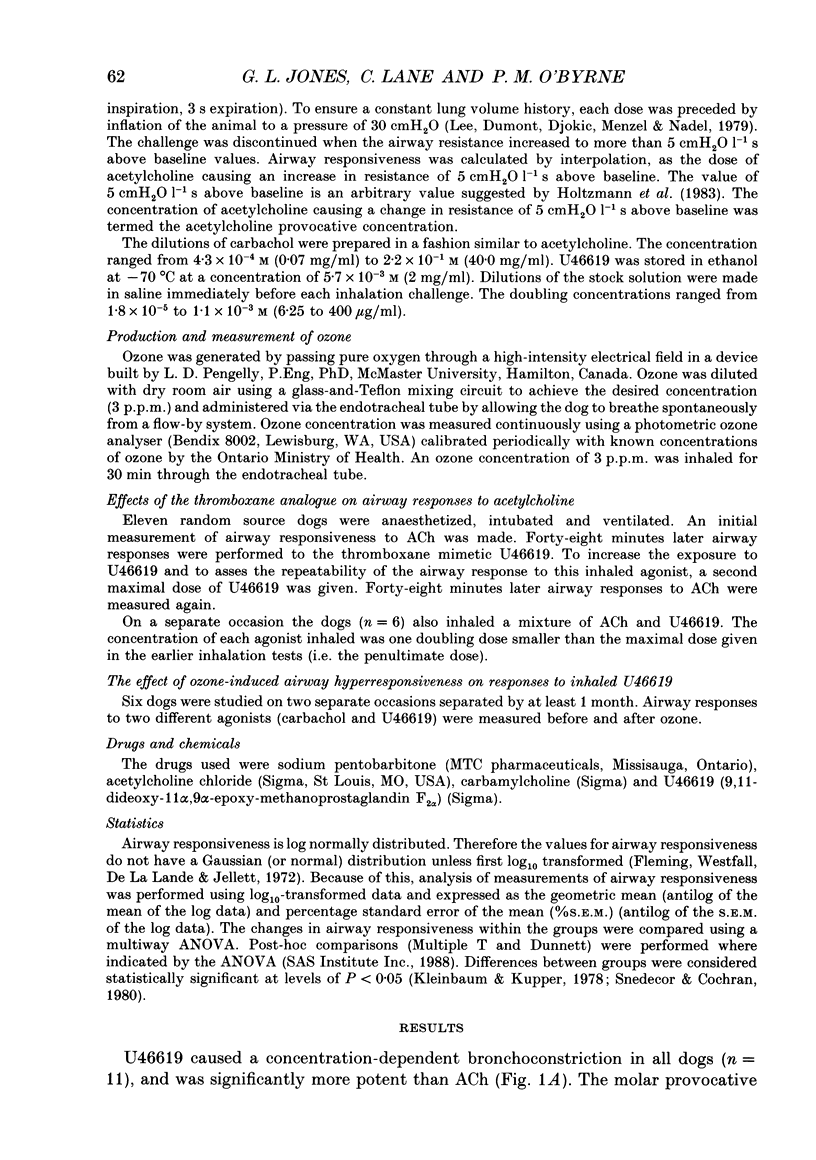
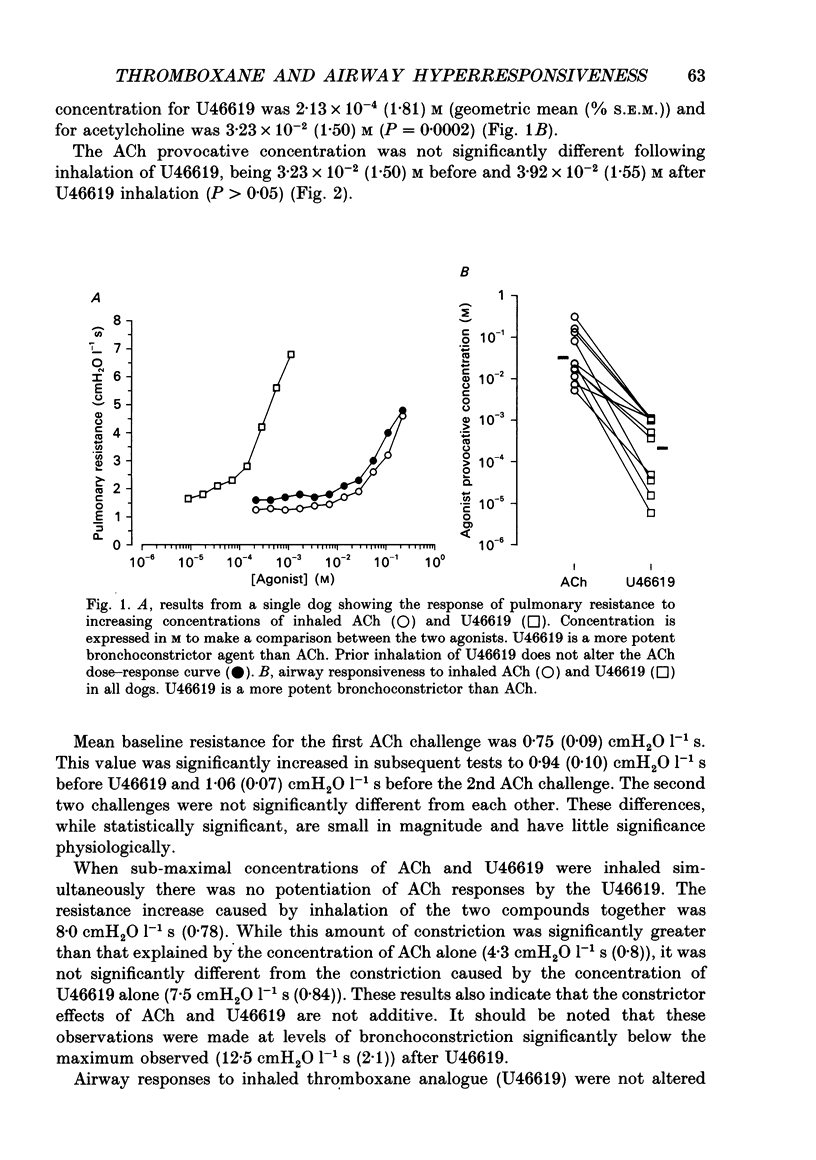
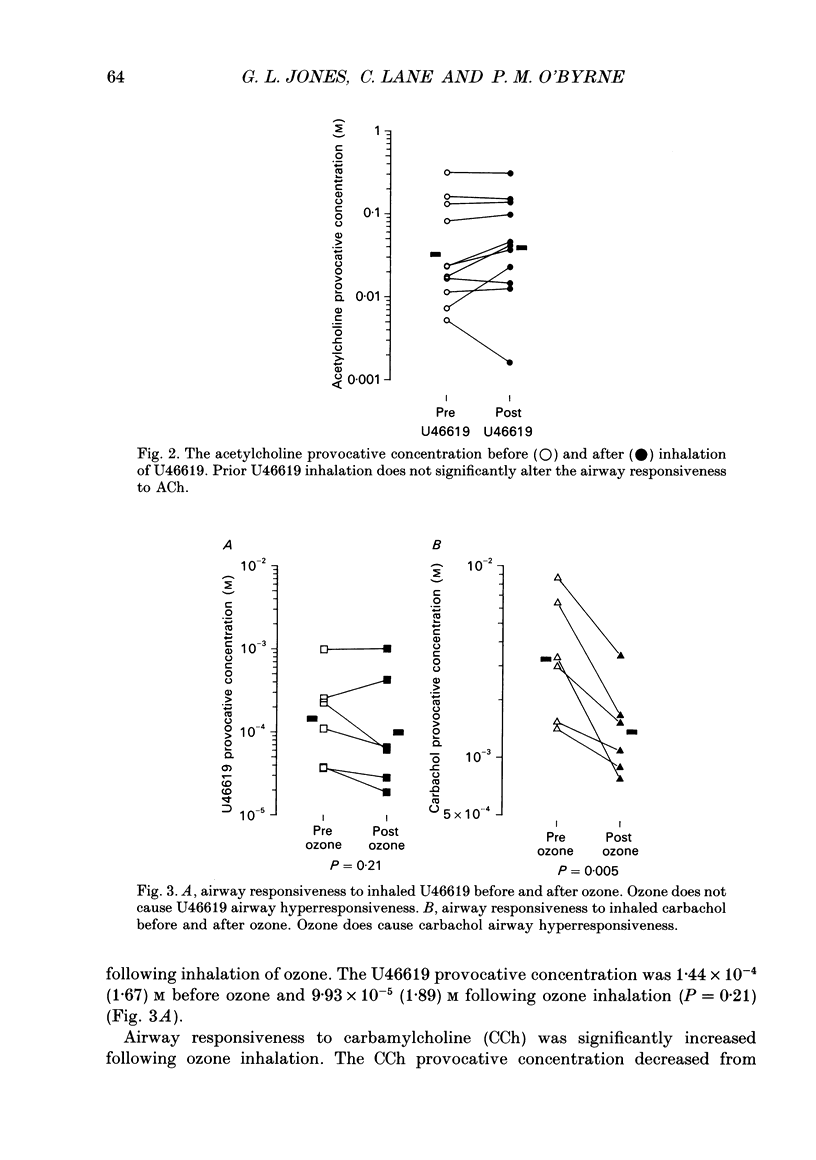
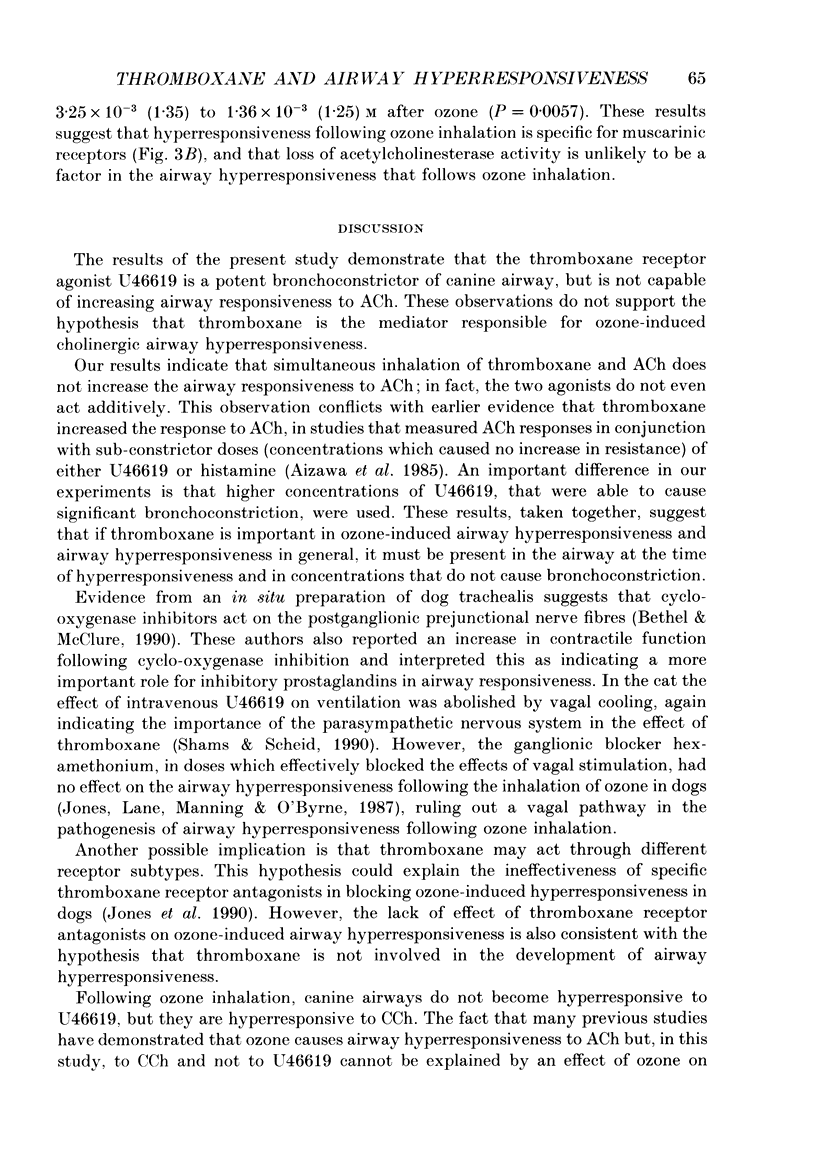
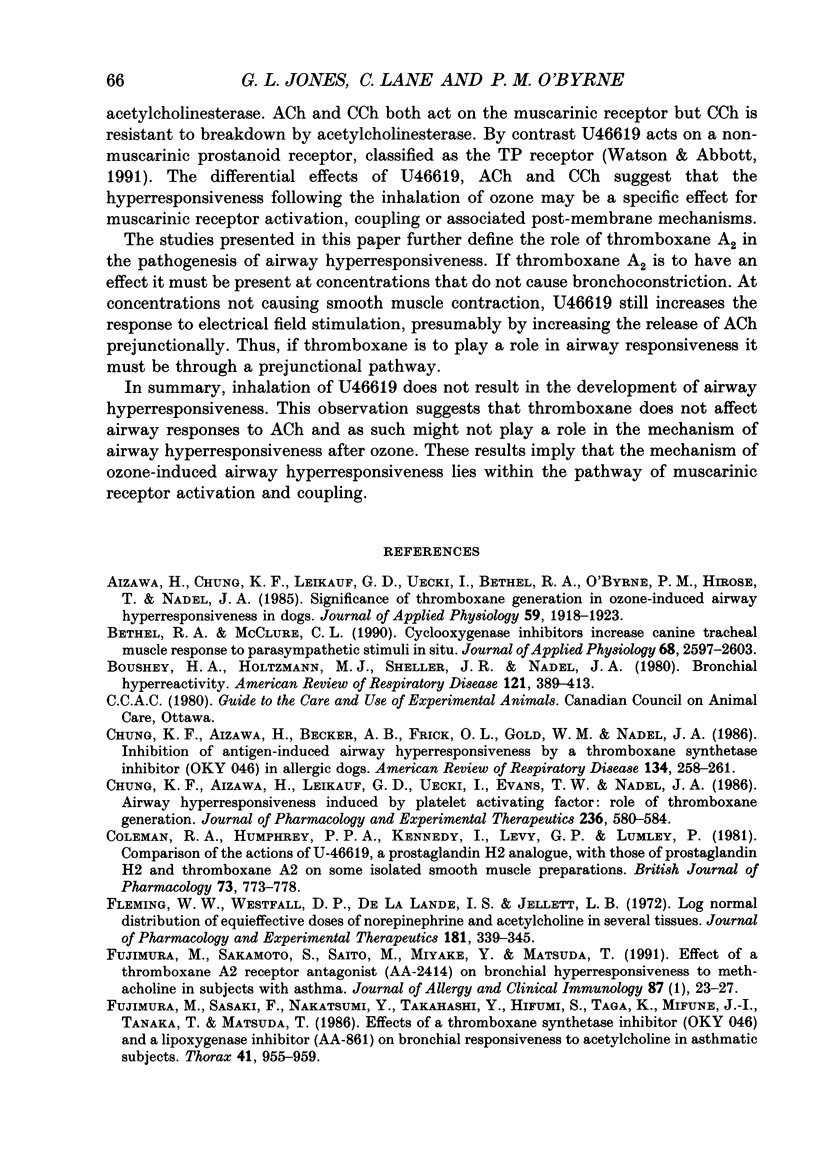
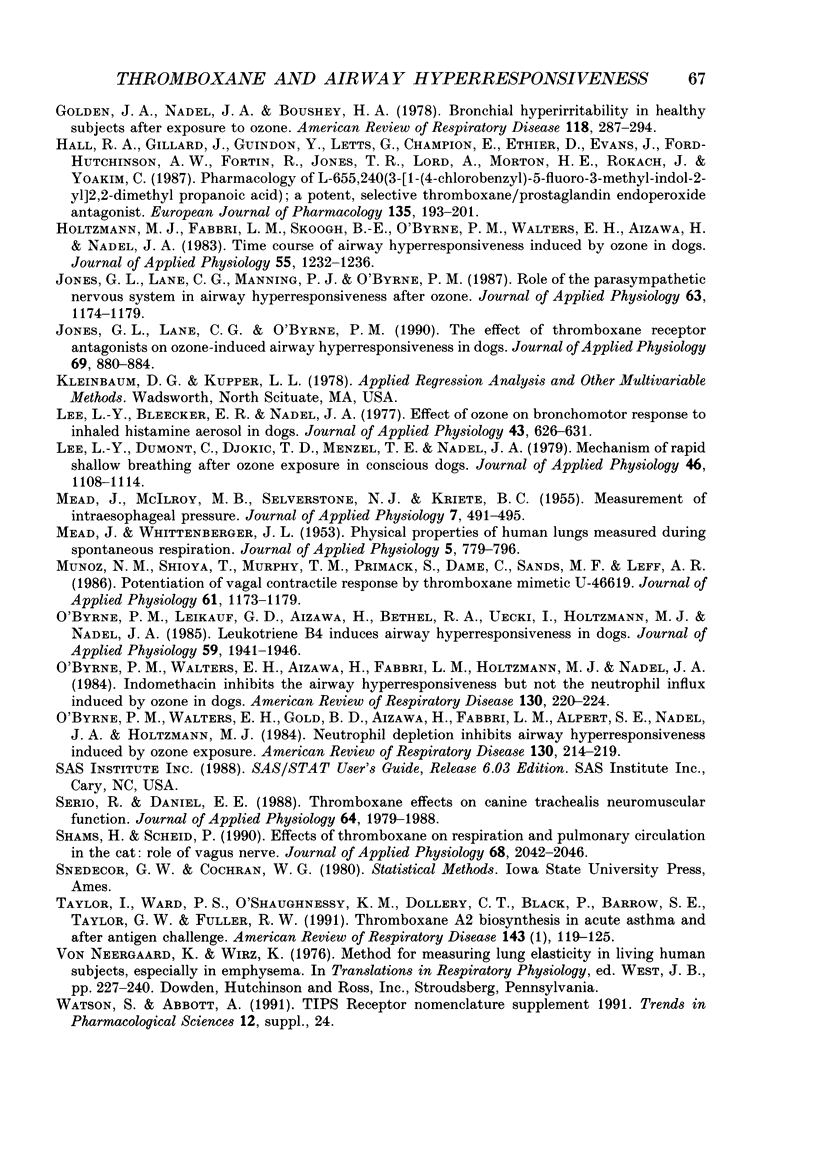
Selected References
These references are in PubMed. This may not be the complete list of references from this article.
- Aizawa H., Chung K. F., Leikauf G. D., Ueki I., Bethel R. A., O'Byrne P. M., Hirose T., Nadel J. A. Significance of thromboxane generation in ozone-induced airway hyperresponsiveness in dogs. J Appl Physiol (1985) 1985 Dec;59(6):1918–1923. doi: 10.1152/jappl.1985.59.6.1918. [DOI] [PubMed] [Google Scholar]
- Bethel R. A., McClure C. L. Cyclooxygenase inhibitors increase canine tracheal muscle response to parasympathetic stimuli in situ. J Appl Physiol (1985) 1990 Jun;68(6):2597–2603. doi: 10.1152/jappl.1990.68.6.2597. [DOI] [PubMed] [Google Scholar]
- Boushey H. A., Holtzman M. J., Sheller J. R., Nadel J. A. Bronchial hyperreactivity. Am Rev Respir Dis. 1980 Feb;121(2):389–413. doi: 10.1164/arrd.1980.121.2.389. [DOI] [PubMed] [Google Scholar]
- Chung K. F., Aizawa H., Becker A. B., Frick O., Gold W. M., Nadel J. A. Inhibition of antigen-induced airway hyperresponsiveness by a thromboxane synthetase inhibitor (OKY-046) in allergic dogs. Am Rev Respir Dis. 1986 Aug;134(2):258–261. doi: 10.1164/arrd.1986.134.2.258. [DOI] [PubMed] [Google Scholar]
- Chung K. F., Aizawa H., Leikauf G. D., Ueki I. F., Evans T. W., Nadel J. A. Airway hyperresponsiveness induced by platelet-activating factor: role of thromboxane generation. J Pharmacol Exp Ther. 1986 Mar;236(3):580–584. [PubMed] [Google Scholar]
- Coleman R. A., Humphrey P. P., Kennedy I., Levy G. P., Lumley P. Comparison of the actions of U-46619, a prostaglandin H2-analogue, with those of prostaglandin H2 and thromboxane A2 on some isolated smooth muscle preparations. Br J Pharmacol. 1981 Jul;73(3):773–778. doi: 10.1111/j.1476-5381.1981.tb16814.x. [DOI] [PMC free article] [PubMed] [Google Scholar]
- Fleming W. W., Westfall D. P., De la Lande I. S., Jellett L. B. Log-normal distribution of equiefective doses of norepinephrine and acetylcholine in several tissues. J Pharmacol Exp Ther. 1972 May;181(2):339–345. [PubMed] [Google Scholar]
- Fujimura M., Sasaki F., Nakatsumi Y., Takahashi Y., Hifumi S., Taga K., Mifune J., Tanaka T., Matsuda T. Effects of a thromboxane synthetase inhibitor (OKY-046) and a lipoxygenase inhibitor (AA-861) on bronchial responsiveness to acetylcholine in asthmatic subjects. Thorax. 1986 Dec;41(12):955–959. doi: 10.1136/thx.41.12.955. [DOI] [PMC free article] [PubMed] [Google Scholar]
- Golden J. A., Nadel J. A., Boushey H. A. Bronchial hyperirritability in healthy subjects after exposure to ozone. Am Rev Respir Dis. 1978 Aug;118(2):287–294. doi: 10.1164/arrd.1978.118.2.287. [DOI] [PubMed] [Google Scholar]
- Hall R. A., Gillard J., Guindon Y., Letts G., Champion E., Ethier D., Evans J., Ford-Hutchinson A. W., Fortin R., Jones T. R. Pharmacology of L-655,240 (3-[1-(4-chlorobenzyl)-5-fluoro-3-methyl-indol-2-yl]2,2-dimethylpro pan oic acid); a potent, selective thromboxane/prostaglandin endoperoxide antagonist. Eur J Pharmacol. 1987 Mar 17;135(2):193–201. doi: 10.1016/0014-2999(87)90611-x. [DOI] [PubMed] [Google Scholar]
- Holtzman M. J., Fabbri L. M., Skoogh B. E., O'Byrne P. M., Walters E. H., Aizawa H., Nadel J. A. Time course of airway hyperresponsiveness induced by ozone in dogs. J Appl Physiol Respir Environ Exerc Physiol. 1983 Oct;55(4):1232–1236. doi: 10.1152/jappl.1983.55.4.1232. [DOI] [PubMed] [Google Scholar]
- Jones G. L., Lane C. G., Manning P. J., O'Byrne P. M. Role of the parasympathetic nervous system in airway hyperresponsiveness after ozone inhalation. J Appl Physiol (1985) 1987 Sep;63(3):1174–1179. doi: 10.1152/jappl.1987.63.3.1174. [DOI] [PubMed] [Google Scholar]
- Jones G. L., Lane C. G., O'Byrne P. M. Effect of thromboxane antagonists on ozone-induced airway responses in dogs. J Appl Physiol (1985) 1990 Sep;69(3):880–884. doi: 10.1152/jappl.1990.69.3.880. [DOI] [PubMed] [Google Scholar]
- Lee L. Y., Bleecker E. R., Nadel J. A. Effect of ozone on bronchomotor response to inhaled histamine aerosol in dogs. J Appl Physiol Respir Environ Exerc Physiol. 1977 Oct;43(4):626–631. doi: 10.1152/jappl.1977.43.4.626. [DOI] [PubMed] [Google Scholar]
- Lee L. Y., Dumont C., Djokic T. D., Menzel T. E., Nadel J. A. Mechanism of rapid, shallow breathing after ozone exposure in conscious dogs. J Appl Physiol Respir Environ Exerc Physiol. 1979 Jun;46(6):1108–1114. doi: 10.1152/jappl.1979.46.6.1108. [DOI] [PubMed] [Google Scholar]
- MEAD J., McILROY M. B., SELVERSTONE N. J., KRIETE B. C. Measurement of intraesophageal pressure. J Appl Physiol. 1955 Mar;7(5):491–495. doi: 10.1152/jappl.1955.7.5.491. [DOI] [PubMed] [Google Scholar]
- Munoz N. M., Shioya T., Murphy T. M., Primack S., Dame C., Sands M. F., Leff A. R. Potentiation of vagal contractile response by thromboxane mimetic U-46619. J Appl Physiol (1985) 1986 Sep;61(3):1173–1179. doi: 10.1152/jappl.1986.61.3.1173. [DOI] [PubMed] [Google Scholar]
- O'Byrne P. M., Leikauf G. D., Aizawa H., Bethel R. A., Ueki I. F., Holtzman M. J., Nadel J. A. Leukotriene B4 induces airway hyperresponsiveness in dogs. J Appl Physiol (1985) 1985 Dec;59(6):1941–1946. doi: 10.1152/jappl.1985.59.6.1941. [DOI] [PubMed] [Google Scholar]
- O'Byrne P. M., Walters E. H., Aizawa H., Fabbri L. M., Holtzman M. J., Nadel J. A. Indomethacin inhibits the airway hyperresponsiveness but not the neutrophil influx induced by ozone in dogs. Am Rev Respir Dis. 1984 Aug;130(2):220–224. doi: 10.1164/arrd.1984.130.2.220. [DOI] [PubMed] [Google Scholar]
- O'Byrne P. M., Walters E. H., Gold B. D., Aizawa H. A., Fabbri L. M., Alpert S. E., Nadel J. A., Holtzman M. J. Neutrophil depletion inhibits airway hyperresponsiveness induced by ozone exposure. Am Rev Respir Dis. 1984 Aug;130(2):214–219. doi: 10.1164/arrd.1984.130.2.214. [DOI] [PubMed] [Google Scholar]
- Serio R., Daniel E. E. Thromboxane effects on canine trachealis neuromuscular function. J Appl Physiol (1985) 1988 May;64(5):1979–1988. doi: 10.1152/jappl.1988.64.5.1979. [DOI] [PubMed] [Google Scholar]
- Shams H., Scheid P. Effects of thromboxane on respiration and pulmonary circulation in the cat: role of vagus nerve. J Appl Physiol (1985) 1990 May;68(5):2042–2046. doi: 10.1152/jappl.1990.68.5.2042. [DOI] [PubMed] [Google Scholar]
- Taylor I. K., Ward P. S., O'Shaughnessy K. M., Dollery C. T., Black P., Barrow S. E., Taylor G. W., Fuller R. W. Thromboxane A2 biosynthesis in acute asthma and after antigen challenge. Am Rev Respir Dis. 1991 Jan;143(1):119–125. doi: 10.1164/ajrccm/143.1.119. [DOI] [PubMed] [Google Scholar]


